A two-week hunting package that experiences two distinctly different areas in South Africa namely the wooded Savannah of the Bushveld and the wide open plains of the Free State.
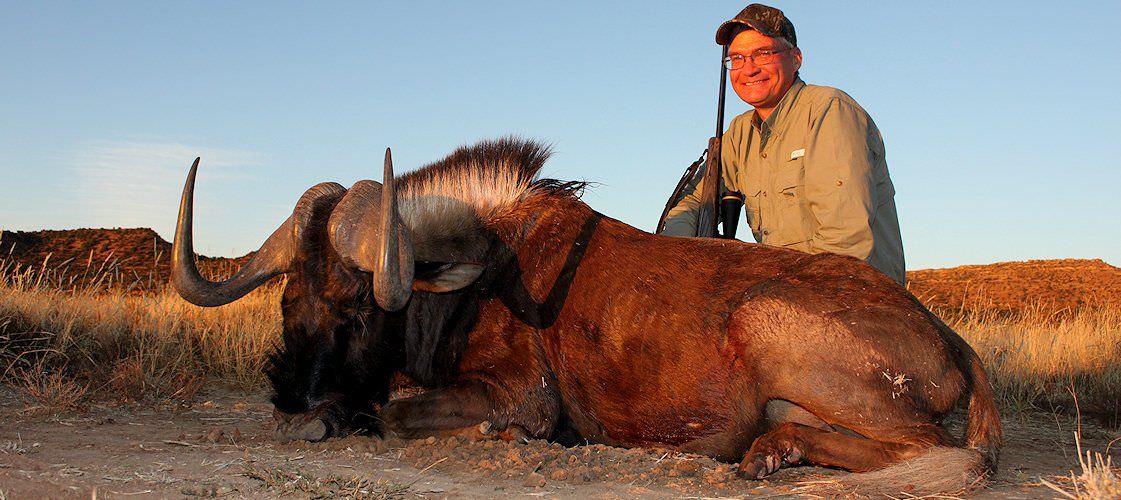
The 14 Day North & South Hunting Package offers clients the opportunity to hunt in two very different regions in South Africa. The package includes eight of the most sought-after plains game trophies in South Africa and is a very affordable way of experiencing a quality African hunt. Our hunting packages contain no hidden costs. The only safari-related costs which are not included are the dipping, packing and shipping of trophies and taxidermy work.
Blesbok (Common), Blesbok (White), Blue Wildebeest, Buffalo, Bush Pig, Bushbuck, Common Reedbuck, Eland, Gemsbok, Giraffe, Grey Duiker, Impala, Jackal, Klipspringer, Kudu, Nyala, Ostrich, Red Hartebeest, Roan Antelope, Sable Antelope, Steenbok, Tsessebe, Warthog, Waterbuck, Burchell's Zebra.
Black Wildebeest, Blesbok (Common), Blesbok (White), Blue Wildebeest, Bontebok, Buffalo, Bush Pig, Bushbuck, Common Reedbuck, Eland, Elephant, Gemsbok, Giraffe, Grey Duiker, Grey Rhebuck, Impala, Jackal, Kudu, Lechwe (Red), Lion, Mountain Reedbuck, Nyala, Oribi, Ostrich, Red Hartebeest, Roan Antelope, Sable Antelope, Springbok (Black), Springbok (White), Springbok (Common), Steenbok, Tsessebe, Warthog, Waterbuck, White Rhino, Zebra (Burchell's), Zebra (Mountain).
You are welcome to take trophies in addition to those included in your package, should the opportunity present itself. All dangerous game has to be pre-booked. Additional trophies are charged at list prices.
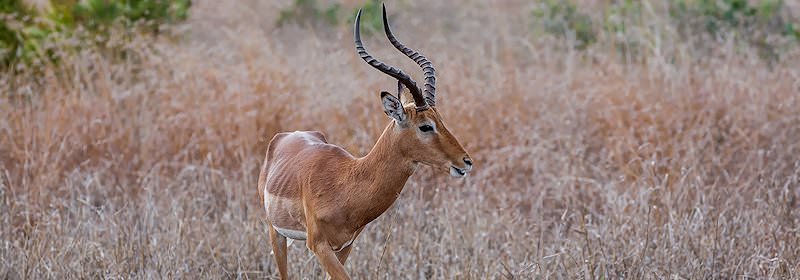
You will be met and welcomed upon arrival at OR Tambo International by your professional hunter or hunters, who will be holding a sign with your name on it as you enter the arrivals lounge. From here the safari travels to the hunting camp, which is located in the bushveld. The afternoon is devoted to sighting of rifles and, time permitting, the first afternoon hunt.
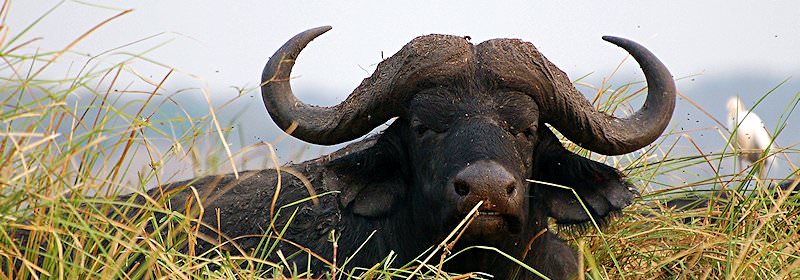
Your days are devoted to hunting in the bushveld. The area is characterized by wooded savanna in varying degrees of density, ranging from densely wooded ravines to rolling hills and open savanna areas. This region supports a large diversity of mammal species and is generally regarded as one of South Africa's finest hunting areas.
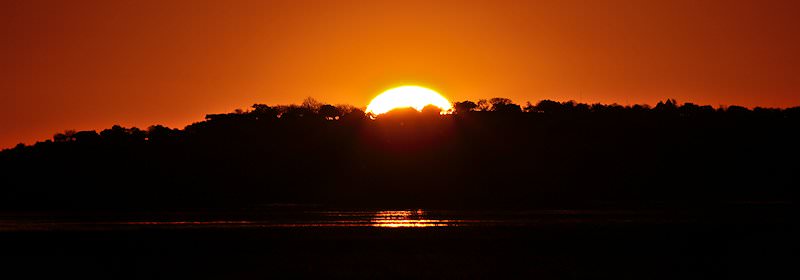
After breakfast, we leave behind the bushveld as the safari makes its way south to the eastern Free State. After a drive of about six hours, we arrive in the Free State during the afternoon. Some time is devoted to relaxing before resuming the hunt the following morning.
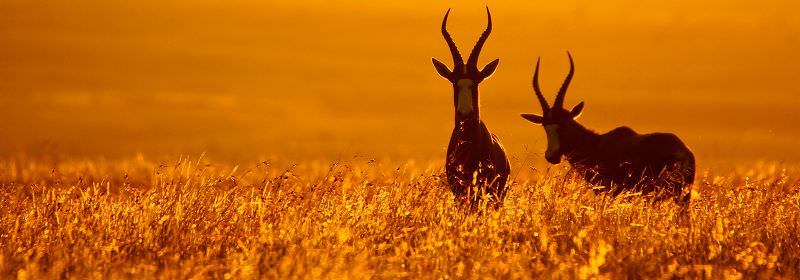
The days are spent hunting in the eastern Free State. The area is bordered by Lesotho, a small land-locked country which is often referred to as the roof of Africa. The Maluti Mountains, which cover a large part of this country, offer the most dramatic mountain scenery in Southern Africa. The high altitude ensures that the summer months have pleasant days, but the winters can be very cold with snow occurring from time to time. Open plains and some wooded ravines characterize this area. Longer shots are often required on the open grassland. An abundance of different plains game species are found in the area.
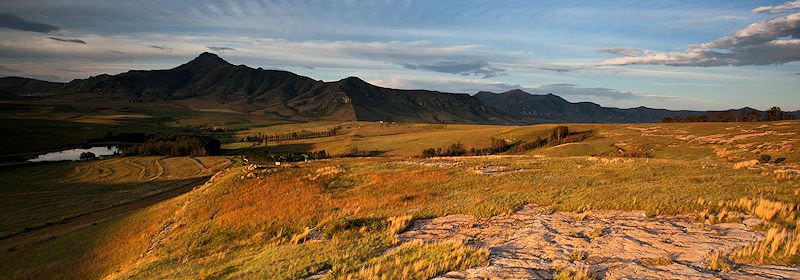
A last morning spent in the African wilderness is followed by a journey to Pretoria and the AS Hunting Adventures office. Some time devoted to paperwork is followed by a late lunch after which guests are transferred to the airport, where their memorable African hunting safari ends.
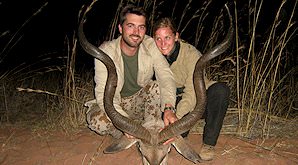
The greater kudu favors broken, hilly or rocky terrain, often in thickly wooded areas. They feed most actively during the fading daylight hours. As such, you are most likely to hunt your trophy during the late afternoon or early evening.
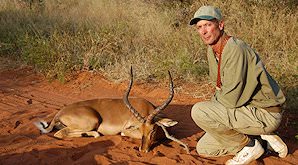
Locating impala is fairly easy, but getting in close enough for a killing shot is an entirely different matter. Their senses are honed to perfection, a fact that may provide some frustration and a good challenge before taking your impala trophy.
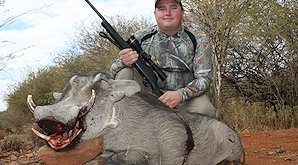
Warthogs do not see very well - they do, however, have a very keen senses of hearing and smell. The hunter can utilize this knowledge to his advantage when hunting warthog in South Africa. Beware of his razor-sharp tusk if he decides to challenge you.
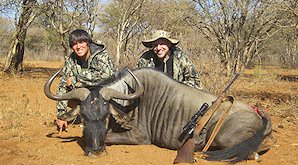
In sandy areas like the Kalahari, blue wildebeest can be hunted by following the distinct spoor they leave in the sandy soil. It is important to always approach them downwind, for their sense of smell is well-developed.
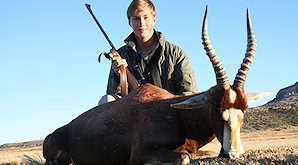
The fact that South Africa's endemic blesbok favors open areas and plains often necessitates longer shots. It is important when hunting blesbok to use a fast caliber with a relatively flat trajectory. A good scope is recommended.
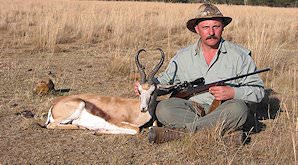
The sprightly springbok is a fairly small antelope that normally has to be taken at a relatively long distance. Under these circumstances, it is advisable to make the side on lung shot for the easiest and most effective kill.
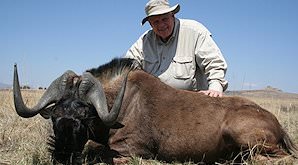
Being an open plains animal, it will often be necessary to make long shots when hunting the black wildebeest. It is a tough animal - clients are advised to make use of a flat shooting .30 caliber to bring down the black wildebeest.
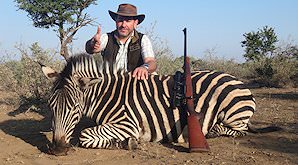
Zebras are most active during the early morning and the late afternoon. They rest during the heat of midday. Zebra are water-dependent and have to drink frequently. In areas with a prevalent threat, zebra tend to drink at night.
Clients are met upon arrival at OR Tambo International Airport in Johannesburg and are returned there upon completion of the safari. Accommodation is in first-rate hunting camps and lodges where all modern amenities are available. Meals are of the highest standard and a large variety of alcoholic and non-alcoholic beverages are available and included.
The success rate on the trophies is close to 100%. If, however, you do not take one of the trophies which is included in the package, 90% of the list price of the trophy is deducted from your hunting safari price. A deposit of 20% is payable upon booking your hunting package. The balance is payable upon completion of the safari.
If your flight arrives after 1pm, we suggest that you overnight at the Castello di Monte Guest House on the day of arrival and start the safari on the following day. A cost of $200 per person includes accommodation, meals and a transfer to the hotel from OR Tambo International Airport in Johannesburg. If you do not wish to bring your own rifles, you are welcome to hunt with one of the rifles of your professional hunter. The only cost involved is the replacement of ammunition (About $100).
The hunting areas range in size from 3 000 to 18 000 acres and all provide an exceptional hunting experience. Our primary focus is ensuring you take the trophies which are included in your safari. We make a determination on which camp to use based on current conditions prior to the starting date of your safari. Our success rate is very close to 100%.
In all cases the camps and lodges we use are luxurious with en suite bathrooms, electricity, stylish decoration and sumptuous food - places where families acting as observers would also feel at home and comfortable. Each of the camps and lodges we use feature on our website in the areas and camps section. We can provide an extensive list of references in your area who have hunted with us and who can bear testament to the quality of accommodation.
A typical hunting day starts just before dawn at which time coffee and rusks are enjoyed. A selection of breakfast cereals, yogurt and juice is also available at this time. We then embark on the morning hunt. We normally hunt until about 11:00 at which time we return to the camp for brunch (a full meal which is a combination of breakfast and lunch). Some time is then devoted to relaxing in camp. The hunt is resumed at about 14:30 and continues until sunset.
The method of hunting employed depends on the preference of the client and can consist of either walking and stalking or hunting from blinds or special vantage points from which we glass and ambush animals. The option of hunting from one of our well-equipped vehicles is also available should you have any medical problems, or are limited by not being able to walk long distances. Your Professional Hunter will discuss these options with you after arrival. All of these options are always available. It is not necessary to let us know which method you prefer prior to your arrival.
Observers are welcome to accompany the hunters on safari or relax in the camp. Should the observers in your group be interested in visiting some of the highlights in the area while the hunters are in the field, this can be arranged at an additional charge of $280 per day. The additional cost is incurred as we need to send a dedicated guide and vehicle to attend to the observers. On a typical safari, observers normally prefer to accompany hunters, which does not incur any additional charges.